The Best Guide to Creating a Winning Digital Marketing Strategy
Guide yourself through the vital components of a successful the best guide to creating a winning digital marketing strategy that will elevate your brand and boost engagement. In today’s competitive landscape, understanding your audience and leveraging the right tools are crucial for achieving your goals. You’ll discover effective methods for optimizing your online presence, utilizing data analytics, and creating powerful content that resonates with your target market. Get ready to transform your approach and drive tangible results that propel your business forward.
Key Takeaways:
- Define Your Objectives: Establish clear and measurable goals for your digital marketing strategy to guide all subsequent actions.
- Understand Your Audience: Conduct thorough research to identify and analyze your target audience’s preferences and behaviors.
- Utilize Multiple Channels: Implement a multi-channel approach by incorporating social media, email, SEO, and PPC to reach a wider audience.
- Create Quality Content: Focus on producing engaging, relevant, and valuable content that resonates with your audience and encourages interaction.
- Leverage Data Analytics: Use analytics tools to track performance metrics and gain insights, allowing for ongoing adjustments to your strategy.
- Monitor Competitors: Keep an eye on competitors’ strategies to identify trends, gaps, and opportunities in your marketing efforts.
- Adapt and Evolve: Stay flexible and be ready to adapt your strategy based on results and changes in the digital landscape.
Understanding Digital Marketing
To create an effective digital marketing strategy, it is crucial to first grasp what digital marketing encompasses.
What is Digital Marketing?
With the rise of technology, digital marketing refers to any marketing efforts that utilize the internet or electronic devices to engage with consumers. It involves various channels and platforms, including social media, email, search engines, and mobile apps, allowing businesses to reach their target audiences where they spend a significant amount of time: online.
Importance of a Digital Marketing Strategy
Strategy is imperative in navigating the complex digital landscape. A well-crafted digital marketing strategy enables you to establish clear objectives and effectively allocate resources, ensuring that your marketing efforts yield maximum results.
Digital marketing is not just an option but a necessity in today’s highly competitive market. Without a robust strategy, you risk losing potential customers to competitors who are leveraging online platforms effectively. A strategic approach helps you understand your audience better, identify key performance indicators, and adapt your tactics to drive growth and improve engagement. Recognizing the importance of a digital marketing strategy is the first step toward building a successful online presence.

Setting Clear Objectives
Some of the most successful digital marketing strategies stem from clearly defined objectives. When you take the time to set specific goals, it not only guides your marketing efforts but also ensures that you remain focused on what truly matters for your business. Without clear goals, your resources may be wasted on activities that do not drive results.
Defining SMART Goals
To create effective goals, you should define SMART goals—Specific, Measurable, Achievable, Relevant, and Time-bound. This framework helps ensure that your goals are not only clear but also realistic and aligned with your overall business strategy, making it easier for you to track progress and make adjustments as necessary.
Key Performance Indicators (KPIs)
SMART goals are crucial, but equally important are Key Performance Indicators (KPIs). These are quantifiable metrics that allow you to measure the success of your marketing efforts against your goals. By establishing KPIs relevant to your goals, you can effectively monitor the effectiveness of your campaigns and make data-driven decisions to maximize your ROI.
Clear KPIs will help you understand how well your strategies are performing and highlight areas that require improvement. For instance, metrics like conversion rates, cost per acquisition, or customer lifetime value can provide valuable insights into your campaign effectiveness. Focusing on these indicators empowers you to make informed adjustments, ensuring your digital marketing strategy remains on the path to success.
Identifying Your Target Audience
Once again, understanding your target audience is crucial for creating a successful digital marketing strategy. By identifying who your ideal customers are, you can tailor your messaging and campaigns to meet their specific needs and preferences, ultimately leading to higher engagement and conversion rates.
Creating Buyer Personas
Buyer personas are detailed profiles of your ideal customers, based on market research and real data about your existing customers. By outlining characteristics such as demographics, interests, and pain points, you can better understand who you’re targeting and create content that resonates with them.
Analyzing Audience Behavior
For effective marketing, you must analyze your audience’s online behavior. This involves monitoring how they interact with your content across various channels, such as social media, email, and your website.
Understanding how your audience engages with your content allows you to adapt your strategy in real time, optimizing for higher engagement rates. Utilize analytics tools to track metrics like click-through rates, time spent on a page, and conversion rates to gain insight into what works and what doesn’t. By focusing on these aspects, you’ll identify patterns that can inform your marketing efforts, helping you cater to your audience’s preferences and ultimately drive greater success for your campaigns.

Developing Your Digital Marketing Mix
Your digital marketing mix is a crucial aspect of your strategy, as it encompasses the tools and techniques you’ll use to reach your target audience effectively. A well-rounded mix ensures that you cover all bases and measure the impact of each channel you utilize.
Content Marketing Strategies
An effective content marketing strategy focuses on delivering valuable, relevant content to your audience. This includes blog posts, videos, podcasts, and infographics that engage and inform your potential customers, ultimately guiding them through the buyer’s journey.
Social Media Engagement
To build strong connections with your audience, engage with them on social media platforms. Regular interactions, timely responses, and sharing of user-generated content foster a sense of community and trust around your brand.
Marketing on social media requires a consistent effort and a strategic approach. By identifying the right platforms for your target audience and utilizing various types of content, you can amplify your brand’s visibility, attract new followers, and strengthen your relationship with existing customers. Remember to analyze your metrics to optimize engagement and reach continuously.
Search Engine Marketing (SEO & PPC)
Marketing your business effectively also involves optimizing your online presence through Search Engine Marketing (SEO &PPC). This process helps your website rank higher in search engine results, making it easier for potential customers to find you.
Utilizing keyword research, optimizing content, and building backlinks are just a few tactics that help you attract organic traffic. As you implement these strategies, you should always monitor your performance, adjusting as necessary to stay ahead of your competitors in the digital space.
Email Marketing Campaigns
Developing an email marketing campaign significantly enhances your communication with leads and customers. Through personalized messages and targeted content, you nurture relationships and encourage repeat business.
Media attention should be given to your email campaigns, as they are a highly effective way to engage your audience. Segmenting your email lists allows you to tailor your messages to specific demographics, increasing the chances of conversion. Remember to track your email metrics, such as open rates and click-through rates, to continuously improve your campaigns and ensure that your messaging resonates with your audience.
Summing up
Summing up, creating a winning digital marketing strategy requires a thorough understanding of your audience, clear goal-setting, and the ability to adapt to changes in the market. By leveraging data analytics, crafting compelling content, and utilizing the right channels, you can effectively connect with your target customers and drive conversions. Remember to continually assess and refine your approach based on performance metrics to ensure lasting success. Empower yourself with the right tools and insights to navigate the dynamic digital landscape and elevate your marketing efforts.
FAQ
Q: What is a digital marketing strategy?
A: A digital marketing strategy is a comprehensive plan that outlines how a business will utilize digital channels to achieve its marketing goals. This includes defining target audiences, selecting digital marketing tools, setting measurable objectives, and establishing criteria for evaluating the effectiveness of campaigns.
Q: Why is a digital marketing strategy important?
A: A digital marketing strategy is crucial because it provides a roadmap for achieving marketing goals in the digital landscape. Without a strategy, businesses may struggle to allocate resources effectively, measure success, or adapt to changing market conditions. It also ensures that all marketing efforts are aligned and integrated, maximizing impact.
Q: What are the key components of a winning digital marketing strategy?
A: Key components of a winning digital marketing strategy include: 1. Goal setting – defining clear, measurable goals. 2. Target audience analysis – identifying the core audience and understanding their preferences. 3. Content strategy – planning what content to create and share. 4. Channel selection – determining which digital marketing channels to use (e.g., social media, email, SEO & PPC. 5. Budget allocation – planning how to spend resources effectively. 6. Measurement and analytics – establishing KPIs and tools for tracking performance. 7. Continuous improvement – regularly reviewing and adjusting the strategy for optimal results.
Q: How can I identify my target audience for a digital marketing strategy?
A: Identifying your target audience involves conducting market research and analysis. Start by defining demographics (age, gender, location), psychographics (interests, lifestyle, values), and behavior patterns (buying habits, online activity). You can use tools like surveys, social media insights, and Google Analytics to gather data and create buyer personas that represent your ideal customers.
Q: What digital marketing channels should I include in my strategy?
A: The choice of digital marketing channels depends on your target audience and business goals. Common channels include social media platforms (Facebook, Instagram, LinkedIn), email marketing, search engine optimization (SEO & PPC), content marketing (blogs, videos), and affiliate marketing. Assess where your audience spends their time and where they engage most actively to select the best channels.
Q: How do I measure the effectiveness of my digital marketing strategy?
A: Measuring effectiveness involves tracking key performance indicators (KPIs) that align with your marketing goals. Common KPIs include website traffic, conversion rate, return on investment (ROI), click-through rates (CTR), engagement metrics (likes, shares, and comments), and customer acquisition costs. Use analytics tools such as Google Analytics, social media insights, and CRM software to monitor and evaluate performance regularly.
Q: How often should I review and update my digital marketing strategy?
A: It is advisable to review your digital marketing strategy at least once every quarter. However, if any significant changes occur in your business environment (e.g., changes in audience behavior, new market trends, or after a major campaign), you should reassess the strategy sooner. Continuous monitoring allows you to adapt to changes and optimize your approach for better results over time.
Ready to boost your brand’s online presence? Dive into the best guide to creating a winning digital marketing strategy. Start now and drive your success today!
Published by Adebola Adeola CEO, Dinet Comms

